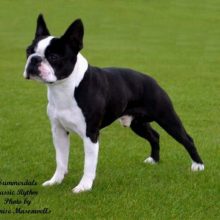Boston Terrier
Lifestyle Needs

The Boston Terrier is a small, short nosed dog with upright ears. He belongs to the Toy group of dogs and is a suitable companion dog or family pet. He is generally even tempered but can be a bit boisterous. His short coat is easy to care for. Like most dogs needs regular exercise and mental stimulation.
Genetic Diversity
(Known as Coefficient of Inbreeding: 'COI'. It should be as low as possible.)
The UK Kennel Club breed average COI is 11.3% - See 'A Beginners Guide to COI'
Gene Pool Size
(Known as Effective Population Size: 'EPS')
36.8
EPS is a measure of how many individuals are contributing genetically to a breed population. It is a measure of the size of the gene pool in a breed. Lower than 100 is considered critical by conservationists and below 50 brings a breed close to extinction. For more information see the Kennel Club article.
Health and Welfare Problems due to Conformation
(Body shape and physical characteristics)
- Brachycephalic airway obstruction syndrome (BOAS)
- Hypoplasia of the trachea
- Dystocia
- Hemivertebrae
BVA/KC Health Schemes: www.bva.co.uk/chs
- Eye Disease: Hereditary cataract (HC) (annual testing); Glaucoma (annual testing); lens luxation (annual testing) Full ophthalmological testing required before breeding
- Eye testing in brachycephalic dogs should be routine as a foreshortened head/face can cause substantial welfare problems throughout a dog’s life.
Estimated Breeding Values (EBVs) : No EBVs are currently available for this breed
www.thekennelclub.org.uk/about-ebvs
DNA Tests Available
DogWellNet and IPFD Harmonisation of Genetic Testing for Dogs (HGTD)
www.dogwellnet.com/breeds
- Primary Hereditary Cataract (HC-HSF4)
Availability of a DNA test does not mean that it is always necessary or even desirable for breeders to use this test.
Other Breed-Specific Health Screening Schemes
The Kennel Club and University of Cambridge Respiratory Function Grading Scheme:
www.thekennelclub.org.uk/rfg-scheme
Breeders must use this Scheme and the accompanying breeding advice to reduce the chances of puppies developing respiratory difficulties as a result of their brachycephalic conformation.
Ask the breeder to show you the certificates for the above tests/screening for both parents. If any of the above tests have not been considered necessary by the breeder (and there may be good reasons), ask her to explain why.
Other Diseases Reported
(For which there are currently no genetic or screening tests for sire or dam)
- Atopy
- Cushings Disease (Hypoadrenocorticism)
- Dystocia
- Patellar luxation
- Spinal deformities
- Corneal ulceration
Ask the breeder about the medical history of the parents, grandparents and great grandparents. Consider carefully whether to purchase a puppy if some of these or other diseases are in the family line.
Ask about the breeder’s policy in cases of serious genetic diseases occurring to your puppy in later life. Good breeders will request to be informed of such events in order to improve future breeding decisions.
You are strongly advised to buy from a breeder who uses (or is prepared to use) the AWF Puppy Contract and Puppy Information Pack (PIP): www.puppycontract.org.uk
The breeder should also be familiar with the CFSG/DBRG Code of Practice for Dog Breeding